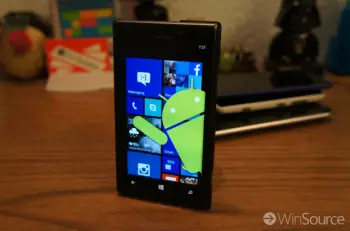
Why Microsoft bringing Android apps to Windows Phone could spell doom for the OS
It’d probably be an understatement to suggest Microsoft is having trouble getting more developers to fill their apps store with the goods users are looking for. Unfortunately they seem to have found themselves in a classic “chicken or egg scenario” — users won’t come to the platform unless there are apps, but developers won’t develop apps if there are no users.
There’s no shame in that problem, as Android suffered it very early on (though obviously quickly eradicated that with being the fastest growing mobile operating system of all time). Unfortunately for Microsoft, gaining market share to attract more developers is easier said than done. If recent rumors are to be believed, they could be getting ready to do something about it.
The Verge is reporting that Microsoft is seriously considering developing an Android runtime for Windows Phone and perhaps other Windows-based platforms (including RT and the full Windows experience). This would allow developers to port their apps over to Windows Phone with little to no effort. Would it be the first signs of a doomed platform?
History repeating itself?
It’s something our friends in Waterloo have already done for Blackberry 10, giving developers an easy and pain-free way to port Android apps (it literally only takes a couple of lines of code and 5 minutes to compile).
In the same breath, it’s worth reminding ourselves that little move didn’t give Blackberry the boisterous app store they needed to attract more users to their slowly dying platform. As a result, Blackberry was almost sold off to vulturous investors (but not before some rich knights in very shiny armor managed to scare them off).
There’s reason to believe that a move like this is actually counterproductive to the strategies of competing platforms. Their idea is that giving developers an easy way to port existing apps will give them the variety they need to dangle a prettier carrot in the face of potential customers. The problem comes in two areas:
- It gives developers absolutely zero incentive to create native Windows Phone apps. If they can make an app for the biggest mobile platform in the world and port it over to one of the youngest and smallest, they’ll likely go that route — especially if they’re small time or independent. That isn’t good for building your own identity and brand.
- Others have already tried… and failed. Why do you want to make the same mistake?
Yes, more apps bring users to your platform, but it’s not going to make a difference if they can get those apps on more popular devices that are bound to be better fits for their needs. And although I’ve never been one to equate the quality of an app store to how many apps there are, the average consumer is going to hear that typical “a million apps!” line from a carrier rep who’s just trying to get them to walk away with a two-year contract, and unfortunately for Windows, they’ll likely be impressed by it.
Developers, Developers, Manufacturers
We’ve seen this happen with Blackberry. We’ve seen this happen with Palm. It’s a chicken and egg scenario where the platform needs apps to lure consumers, but developers don’t want to develop for a platform without consumers (and therefore viable revenue).
But the case with Windows Phone is different. iOS is the only successful competitor able to sustain itself with a closed ecosystem, making both their hardware and their software. WebOS folded despite having a beautiful OS because they couldn’t pump out phones quick enough and they were the only ones making WebOS phones. Blackberry added Android support for much of the same reason and you know how that’s turned out. Microsoft, though, relies on manufacturing partners to produce Windows Phones.
If Microsoft allows Android Apps it displays a lack of confidence in their own OS and ecosystem. And if Microsoft is creating Windows Phones with Android support, and creating Android Phones with newly acquired Nokia, why should manufacturers like HTC, Samsung, or Huawei have any confidence in developing phones?
Losing developers is one thing and losing manufacturers is another. By inviting Android Apps into their ecosystem, Microsoft will lose both. If Nokia can become the next Apple of Windows Phones that might work, but let’s not fool ourselves.
Are the “Windows” closing for Microsoft?
The Windows Phone platform isn’t bad at all, but it sounds like they could be coming to a point where they’re forced to face a certain harsh reality — there just might not be room for three major platforms in the smartphone space.
Android’s already giving iOS a tough time, and any other sliver of market share outside of the pieces those two share is too insignificant to care about. Soon enough, they’re going to realize that they will either have to foster enough innovation to get consumers to pay attention, or concede defeat and come to grips with the truth — that they’re simply not fit for this tough fight.
Of course, there’s a chance these rumors could be a big pile of bologna so it’s wise to make sure we aren’t getting ahead of ourselves. Still, you have to wonder if this could be considered the first of many “spaghetti sticking to walls” ideas before an eventual white towel is thrown into the ring.
Edgar from ChromeSpot, Joe from WinSource and Phandroid’s very own Chris all had a nice little chat about it on Hangouts earlier today, so be sure to catch that little discussion above if you missed it. After that, meet us in the comments section and let us know what you think!
[via WinSource]
